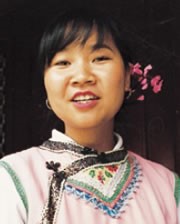Phola in China

Photo Source:
Copyrighted © 2026
Operation China, Asia Harvest All rights reserved. Used with permission |
Send Joshua Project a map of this people group.
|
| People Name: | Phola |
| Country: | China |
| 10/40 Window: | Yes |
| Population: | 14,000 |
| World Population: | 14,000 |
| Primary Language: | Phola |
| Primary Religion: | Ethnic Religions |
| Christian Adherents: | 0.15 % |
| Evangelicals: | 0.10 % |
| Scripture: | Translation Needed |
| Ministry Resources: | No |
| Jesus Film: | No |
| Audio Recordings: | No |
| People Cluster: | Tibeto-Burman, other |
| Affinity Bloc: | Tibetan-Himalayan Peoples |
| Progress Level: |
|
Introduction / History
In China, the Pula were probably among the first inhabitants of the areas where they now live. Some migrated to Vietnam very long ago. Vietnamese writer Le Quy Don, famous for his book written in the mid-1700s, Kien Van Tieu Luc (Things Seen and Heard), described the Pula who at that time were already settled in northern Vietnam.
The Pula have been largely ignored in the complex ethnic patchwork of southern China. The Chinese authorities have included them as part of the Yi nationality. In 1903 the Pula were described as being only about 4 1/2 feet tall.
What Are Their Lives Like?
Traditional dress varies significantly among Pula in different areas along the Honghe River, a fact reflected in the headdress of different regions: "Pula women of southern Gejiu County wear multi-colored embroidered headpieces which stand up straight from their foreheads; Pula women in Yuanjiang County of Yuxi Prefecture often wear elaborate 'yarn bundle' headdresses, and married women of Honghe County plait their hair on the tops of their heads and wrap their heads with green turbans."
There are numerous social rules and superstitions among the Pula in Yuanjiang County. For example, if a child's upper tooth falls out the parents take the tooth and put it under the bed. On the other hand, if a lower tooth falls out, the tooth is placed on the roof. Only in this way, it is thought, can one be sure a new tooth will grow in its place. The Pula consider it impolite to ride a horse into another village. No one is allowed to sit in the doorway of a home for fear that the god of wealth will be blocked from taking up residence there. Inside a Pula home, people are forbidden to sit on the rice-husking mortar, which they believe can bring a curse of famine on the family.
What Are Their Beliefs?
The Pula believe that a god named Mumi created the heavens and earth, humans and all spirits. "On the first 'rabbit' day after the Chinese New Year, the Pula worship the sky; on the first 'ox' day they worship the earth and the village god; and on the first 'tiger' day they call all the spirits to their aid in the new year. The Pula hold many ceremonies which ... sacrifice a pig. After the sacrifice a feast is held beneath the sacred tree of the village." In every Pula home the most sacred room is a central bay which contains the ancestral altar. Next to the altar is a tiny "spirit door" about 10 inches wide.
There are just a few known Christians among the Pula in China, while only one or two families are known to have found Christ among this unreached group in northern Vietnam. Pula gospel recordings were first produced in 1999.
What Are Their Needs?
The Phola people need to submit to Jesus Christ so they can experience the abundant life he offers them in John 10:10.
Prayer Points
Pray for the spiritual blindness and bondage to the evil one to be removed so they can understand and respond to Christ.
Pray for the Lord to provide for their physical and spiritual needs as a testimony of his power and love.
Pray that the Phola people will have a spiritual hunger that will open their hearts to the King of kings.
Pray for an unstoppable movement to Christ among them.